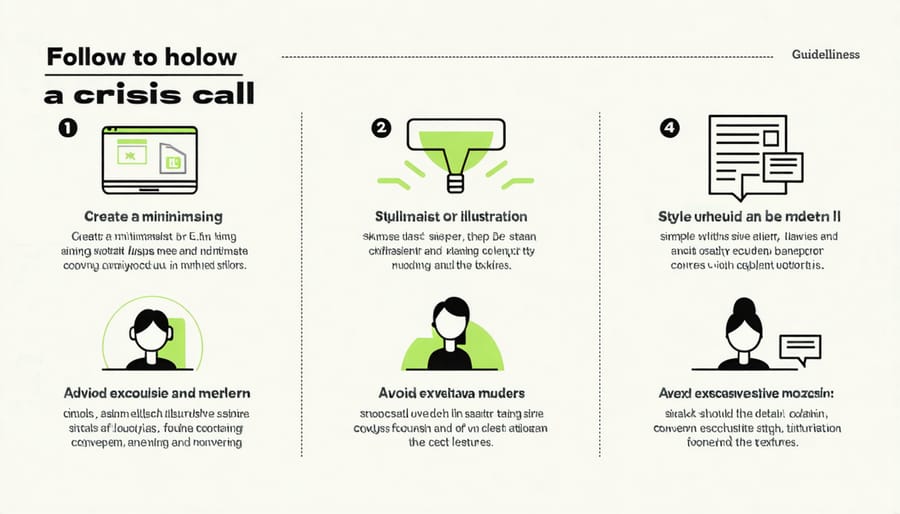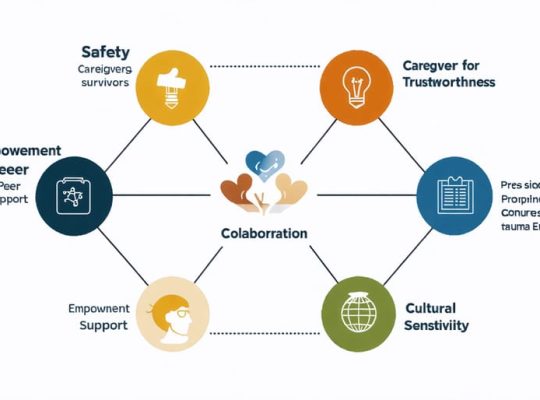Reach out immediately when you feel overwhelmed – parenting crisis hotlines operate 24/7, staffed by trained professionals who understand the unique challenges of raising children. Every parent faces moments of uncertainty, fear, or frustration, and seeking help isn’t just brave – it’s essential for both you and your child’s wellbeing. These confidential lifelines provide urgent emotional support, practical guidance, and connections to local resources when you need them most.
Whether you’re dealing with a teenager’s mental health emergency, a child’s behavioral crisis, or simply feeling at your breaking point, crisis counselors offer judgment-free support tailored to your specific situation. They’re equipped to handle everything from immediate safety concerns to ongoing parenting challenges, helping you navigate difficult moments while developing stronger coping strategies for the future.
Remember: reaching out for help demonstrates strength, not weakness. Crisis hotlines serve as a vital bridge between immediate emotional support and long-term solutions, ensuring no parent has to face challenging moments alone. These services have already helped millions of families navigate their darkest hours and emerge stronger, more resilient, and better equipped to handle future challenges.
Understanding Parental Crisis Support

Common Crisis Situations Parents Face
Parents often face challenging situations that can feel overwhelming and require immediate support. Common crisis scenarios include dealing with a child’s severe anxiety or panic attacks, managing aggressive outbursts or self-harming behaviors, and responding to suicidal thoughts or expressions. Many parents also seek help during intense family conflicts, especially with teenagers, or when witnessing significant behavioral changes in their children.
Some parents reach out during moments of personal overwhelm, particularly when feeling unable to cope with parenting responsibilities or experiencing their own mental health challenges. The impact of childhood trauma can resurface during parenting, making it crucial to seek support when these feelings become overwhelming.
Crisis support is also frequently needed when families face sudden changes like divorce, loss of a loved one, or relocation. Parents may also require immediate guidance when dealing with bullying situations, substance use concerns, or discovering their child is experiencing abuse. Remember, seeking help during these situations isn’t a sign of weakness – it’s a responsible step toward ensuring both parent and child wellbeing.
The Role of Crisis Hotlines
Crisis hotlines serve as a vital lifeline for parents navigating challenging situations with their children. These 24/7 services provide immediate, confidential support from trained professionals who understand the unique pressures of parenting. Whether you’re dealing with a teen’s emotional breakdown, a child’s severe anxiety, or feeling overwhelmed yourself, these dedicated counselors offer life-saving crisis techniques and emotional support when you need it most.
Hotline counselors are equipped to help parents assess situations, develop immediate action plans, and connect with local resources. They offer a calm, non-judgmental space where parents can openly discuss their concerns and receive practical guidance. These services are particularly valuable during late-night emergencies when other support systems may be unavailable.
Beyond immediate crisis intervention, hotline staff can help parents identify warning signs, develop coping strategies, and create safety plans for future situations. They also provide referrals to long-term support services, ensuring families receive continuous care beyond the initial crisis.
Remember, reaching out isn’t a sign of weakness – it’s a powerful step toward getting the support your family needs.
Available Crisis Support Services

National Crisis Hotlines
When your family needs immediate support, several national crisis hotlines are available 24/7 to provide expert guidance and child safety crisis intervention. The National Parent Helpline (1-855-427-2736) offers emotional support and resources for parents feeling overwhelmed or struggling with their children’s behavior.
For situations involving child abuse or neglect, the Childhelp National Child Abuse Hotline (1-800-422-4453) provides crisis counseling, information, and referrals to local support services. Their trained counselors understand the complexities of family dynamics and offer judgment-free assistance.
The National Crisis Text Line (text HOME to 741741) is particularly helpful for parents who prefer texting over phone calls. Their crisis counselors are well-versed in family issues and can help de-escalate tense situations while connecting you with appropriate resources.
Parents dealing with their teen’s mental health challenges can reach out to the National Alliance on Mental Illness (NAMI) HelpLine (1-800-950-NAMI). They provide guidance, educational resources, and connections to local support groups.
The Trevor Project (1-866-488-7386) specifically supports LGBTQ+ youth and their parents, offering crisis intervention and suicide prevention services. Their counselors are specially trained to address the unique challenges these families may face.
Remember, reaching out isn’t a sign of weakness – it’s a smart step toward getting the support your family needs during difficult times.
Local Support Options
While national crisis hotlines provide invaluable support, your local community likely offers additional resources that can provide face-to-face assistance during challenging times. Start by contacting your family doctor or pediatrician, who can connect you with trusted mental health professionals and support services in your area.
Many communities have family resource centers that offer emergency counseling, parent support groups, and crisis intervention services. These centers often provide both scheduled appointments and walk-in crisis support. Local hospitals typically maintain lists of crisis counselors and can direct you to appropriate resources, especially during after-hours emergencies.
Your child’s school district may also offer crisis intervention services through school counselors or social workers. These professionals are familiar with child development and can provide immediate support while helping coordinate longer-term assistance.
Religious organizations and community centers frequently host support groups and can connect you with crisis counselors who understand your cultural background and values. Many counties operate their own crisis response teams that can provide in-person support during emergencies.
Consider reaching out to your local chapter of Mental Health America or NAMI (National Alliance on Mental Illness), as they maintain comprehensive databases of community resources and can guide you to appropriate support services. Remember, these local options often work in conjunction with crisis hotlines to provide comprehensive support during difficult times.
Digital Crisis Support Resources
In today’s digital age, crisis support is available at your fingertips through various online platforms and text-based services. Many parents find these options particularly helpful when they need silent communication or prefer writing over speaking.
Crisis Text Line offers 24/7 support by texting HOME to 741741. Trained crisis counselors respond quickly, providing confidential support for parents dealing with overwhelming situations. This service is especially valuable when you need guidance but can’t speak openly, such as when children are nearby.
Several apps provide immediate crisis support and resources. The Calm Harm app helps parents manage urges and overwhelming emotions, while the NotOK app allows you to quickly alert your chosen contacts when you’re struggling and need support.
Social media platforms have also implemented crisis support features. Facebook’s crisis support tool connects users with helpline resources and allows friends to reach out directly. Instagram offers similar support options through its Help Center.
Online chat services through organizations like IMAlive provide real-time crisis intervention through typed conversations. These platforms are staffed by trained volunteers who understand parenting challenges and can offer immediate support and resources.
Remember that while digital resources are convenient, they shouldn’t replace professional help in severe situations. These tools work best as part of a comprehensive support system, complementing traditional crisis services and ongoing mental health care.
Making the Most of Crisis Support
When to Call
It’s crucial to recognize when you need immediate support as a parent. Don’t hesitate to call a crisis hotline if you’re experiencing overwhelming feelings of frustration, anger, or helplessness in your parenting role. Reach out immediately if you fear you might harm yourself or your child, or if you’re having thoughts that make you uncomfortable.
Call when your child is showing concerning behaviors such as severe depression, talking about self-harm, or expressing suicidal thoughts. If you’re facing a domestic crisis, dealing with a runaway situation, or struggling with your child’s severe behavioral issues, crisis counselors are there to help.
Remember, you don’t need to be at your breaking point to call. Contact the hotline if you’re feeling isolated, struggling to cope with your child’s needs, or simply need someone to talk to about your parenting challenges. Early intervention can prevent situations from escalating.
There’s no such thing as a problem too small or too big. Whether you’re dealing with daily parenting stress or facing a serious emergency, trained counselors are available 24/7 to provide support, guidance, and resources without judgment.
What to Expect
When you call a parenting crisis hotline, you’ll be connected with a trained crisis counselor who understands the challenges of raising children. These professionals are equipped to provide immediate emotional support and practical guidance using proven approaches like the 4-step intervention model.
During your call, the counselor will first ensure everyone’s immediate safety and help you feel calm and supported. They’ll listen without judgment as you explain your situation, whether it’s dealing with a child’s severe behavioral issues, feeling overwhelmed by parenting responsibilities, or managing a family crisis.
The counselor will help you identify immediate steps to address the situation and can connect you with local resources when needed. Many hotlines offer follow-up calls and can provide referrals to ongoing support services, including family therapists, support groups, or community programs.
You can expect complete confidentiality, though counselors are required to report situations involving immediate danger to a child’s safety. Calls typically last as long as needed – from a few minutes to an hour – and you can call back any time you need additional support.
Remember, reaching out isn’t a sign of weakness but a demonstration of responsible parenting. Crisis counselors are there to support you through difficult moments and help you develop strategies for future challenges.

Follow-Up Care
After speaking with a crisis counselor, it’s important to build on the support and guidance you’ve received. Take time to reflect on the conversation and implement any suggested strategies or resources. Many hotlines provide referrals to local mental health professionals, support groups, or parenting workshops – following through with these recommendations can help create lasting positive changes.
Consider creating a wellness plan that includes regular check-ins with mental health professionals, establishing a support network of friends and family, and identifying triggers that may lead to future crises. Keep the crisis hotline number easily accessible, as you can call again if needed – there’s no limit to how many times you can reach out for support.
Document what worked well during your crisis call and what coping strategies were most helpful. This information can be valuable for future reference. Remember that seeking help isn’t a one-time event but part of an ongoing journey toward better mental health and stronger parenting skills.
If you received specific safety plans or parenting strategies during your call, post them somewhere visible and share them with other caregivers in your child’s life when appropriate.
Reaching out for help during a parenting crisis isn’t just an option – it’s an act of strength and love for both you and your children. Remember, countless parents face similar challenges, and seeking support is a sign of responsible parenting, not weakness. The dedicated professionals staffing these crisis hotlines understand the complex emotions and situations you’re experiencing, and they’re there to provide immediate, judgment-free support whenever you need it.
Don’t wait until you’re at your breaking point. These services are available 24/7, offering everything from a compassionate listening ear to practical guidance and emergency intervention when necessary. Whether you’re dealing with a teenager’s mental health crisis, feeling overwhelmed with a toddler’s behavior, or simply needing someone to talk to during a difficult moment, there’s always someone ready to help.
Keep these crisis hotline numbers stored in your phone, posted on your refrigerator, or saved somewhere easily accessible. Share them with other parents, caregivers, and family members. Building a support network and knowing where to turn in times of crisis can make all the difference in managing challenging situations and maintaining your family’s well-being.
Remember, you’re not alone in this journey. Every call you make is a step toward creating a safer, healthier environment for your family. Your children deserve a parent who knows when to ask for help – and you deserve the support to be that parent.







